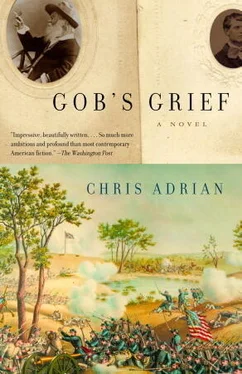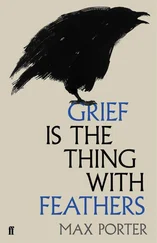Dr. Walker noticed Walt standing by the door. “Mr. Whitman,” she said. “If you would assist me?” Walt put his arm around Dr. Woodhull and bore him up, away from the body and out of the dead house. They put the doctor in an empty cot, in a half-empty ward.
“Oh, darling,” said Woodhull, “I don’t even want to think about it.” He turned over on his side and began to breathe deeply and evenly.
Dr. Walker took a watch from her pocket and looked at it. “A wire has come,” she said. “They’re moving a thousand boys from the field hospitals.” Then she leaned down close to Woodhull’s snoring face and said, “You had better be well and awake in five hours, sir.” She straightened up, adjusted her hat on her head, and uttered an explosive sigh. “General Stuart has died,” she said to Walt. “Did you know that? Shot by a lowly infantryman. I had a dream once that Stuart came for me on his horse, with garish feathers in his hat. ‘Come along with me, Mary,’ he said. ‘Not by your red beard, General Satan,’ said I. ‘Get thee behind me.’” She paused a moment, and they stood together looking down at the serene Dr. Woodhull. “Do you suppose I did the right thing? Would you have gone with him?”
“No,” Walt said, “of course not.” But really he thought that he might have. He pictured himself riding west with General Stuart, to a place where the war could not touch them. He imagined the tickly feeling the General’s feathers would make in his nose as they rode to the extreme edge of the continent. And he thought of the two of them riding shirtless through sunny California, of reaching out their hands as they passed through vineyards, and of picking fat grapes from heavy vines.
“I got to get out,” said Hank. A week had passed, and the wounded from Spotsylvania had stuffed Armory Square to the gills. Hank’s leg was scheduled to come off in two days. In the dead house, a pile of limbs edged towards the ceiling.
“Settle down,” said Walt. “There’s no cause for alarm.”
“I won’t let them have it. You got to help me get out. I won’t make it if they take my leg. I know I won’t.” Hank had a raging fever, and tended to sink into delirium with the sunset.
“Dr. Walker is said to wield the fastest knife in the army. You’ll be asleep. You won’t feel it.”
“Ha!” said Hank. He gave Walt a long, wild look. “Ha!” He put his face in his pillow and wouldn’t talk anymore. Walt walked around the wards, meeting the new boys, then went to the chapel, where there were many services.
That night, unable to sleep, Walt made his usual tour of the city, stopping for a long time outside of Armory Square. He found himself outside of Hank’s window, and then inside, next to his bed. Hank was sleeping, his arm thrown up above his head, his sheet thrown off and his shirt riding up his hairy belly. Walt reached out and touched his shoulder.
“All right,” Walt said. “Let’s go.”
It was not a difficult escape. The hardest part was getting Hank’s trousers on. It was very painful for Hank to bend his knee, and he was feverish and disoriented. The night attendants were in another ward; they saw no one on their way out except Oliver Barley, who glared at them and then rolled over in his bed, but raised no alarm. They stole a crutch for Hank, but he fell on the Mall, and the crutch broke under him. He wept softly with his mouth in the grass. Walt picked him up and carried him on his back, towards the canal and over it, then into Murder Bay, where Hank cried to be put down. They rested on a trash heap teeming with small, crawling things.
“I think I want to sleep,” said Hank. “I’m so tired.”
“Go ahead, my dear,” said Walt. “I shall take care of you.”
“I would like to go home,” Hank said as he put his head against Walt’s shoulder. “Take me back to Hollow Vale. I want to see my sister.” Hank slowly fell asleep, still mumbling under his breath. They sat there for a little while.
If this heap were a horse, thought Walt, we could ride to California. “Never mind General Stuart,” Walt said aloud, taking Hank’s wet hand in his own. “In California there is no sickness. Neither is there death. On their fifth birthday, every child is made a gift of a pony.” He looked at Hank’s drawn face glowing eerily in the moonlight — he looked dead and returned from the dead. “In California, if you plant a dead boy under an oak tree, in just five days’ time a living hand will emerge from the soil. If you grasp that hand and pull with the heart of a true friend, a living body will come out of the earth. Thus in California death never separates true friends.” Walt looked awhile longer into Hank’s face. His eyes were darting wildly under the lids. Walt said, “Well, if we are going to get to California soon, we had best leave now.” But when eventually Walt picked him up he brought Hank back to the hospital.
“You will wash that beard before you come into my surgery,” said Dr. Woodhull. Walt stank of garbage. He went to a basin and Dr. Walker helped him scrub his beard with creosote, potassium permanganate, and Labarraque’s solution. Walt held a sponge soaked with chloroform under Hank’s nose, even though he hadn’t woken since falling asleep on the heap. He kept his hand on Hank’s head the whole time, but he could not watch as Dr. Walker cut in and Dr. Woodhull tied off the arteries. He looked down and saw blood seeping across the floor, into mounds of sawdust.
“That is America’s choicest blood on the floor,” Walt said to Dr. Woodhull, but he and Dr. Walker were too intent on their task to hear him. Walt fixed his attention on a lithograph on the far wall. It was torn from some book of antiquities, a depiction of reclining sick under the care of the priests of Aesclepius, whose statue dominated the temple. There was a snake-entwined staff in his hand, and a large friendly-looking stone dog at his feet. Every night for a thousand years , it said, the sick and despairing sought healing and dreams at the temples of Aesclepius. Walt closed his eyes and listened to the saw squeaking against Hank’s bones. He put his hand on Hank’s head and thought, Live, live, live.
Hank woke briefly.
“They got my leg,” he said. “You let them take it.”
“No,” said Walt. “I’ve got it right here.” The limb was in his lap, bundled in two clean white sheets. He would not let the nurses take it to the dead room. Walt passed it to Hank, who hugged it tight against his chest.
“I don’t want to die,” Hank said.
Walt packed his bag and sat on it, waiting at the station for the train that would take him back to Brooklyn. When it finally arrived, Walt stayed sitting on his bag, not even looking up at the train when it sat waiting noisily by the platform, and when the conductor asked him if he would board, he said nothing. When the train was gone again, he got up and went back to Armory Square. It was night. Hank’s bed was still empty. He sat down on it and rummaged in his coat for a pen and paper. He wrote in the dark:
Dear Friends ,
I thought it would be soothing to you to have a few lines about the last days of your son, Henry Smith, of Company E of the 14th Missouri Volunteers. I write in haste, but I have no doubt anything about Hank will be welcome.
From the time he came into Armory Square Hospital until he died there was hardly a day but I was with him a portion of the time — if not in the day then at night — (I am merely a friend visiting the wounded and sick soldiers). From almost the first I feared somehow that Hank was in danger, or at least he was much worse than they supposed in the hospital. He had a grievous wound in his leg, and the typhoid, but as he made no complaint they thought him nothing so bad. He was a brave boy. I told the doctor of the ward over and over again he was a very sick boy, but he took it lightly and said he would certainly recover; he said, “I know more about these cases than you do — he looks very sick to you, but I shall bring him out all right.” Probably the doctor did his best — at any rate about a week before Hank died he got really alarmed, and after that all the doctors tried to help him but it was too late. Very possibly it would not have made any difference.
Читать дальше












